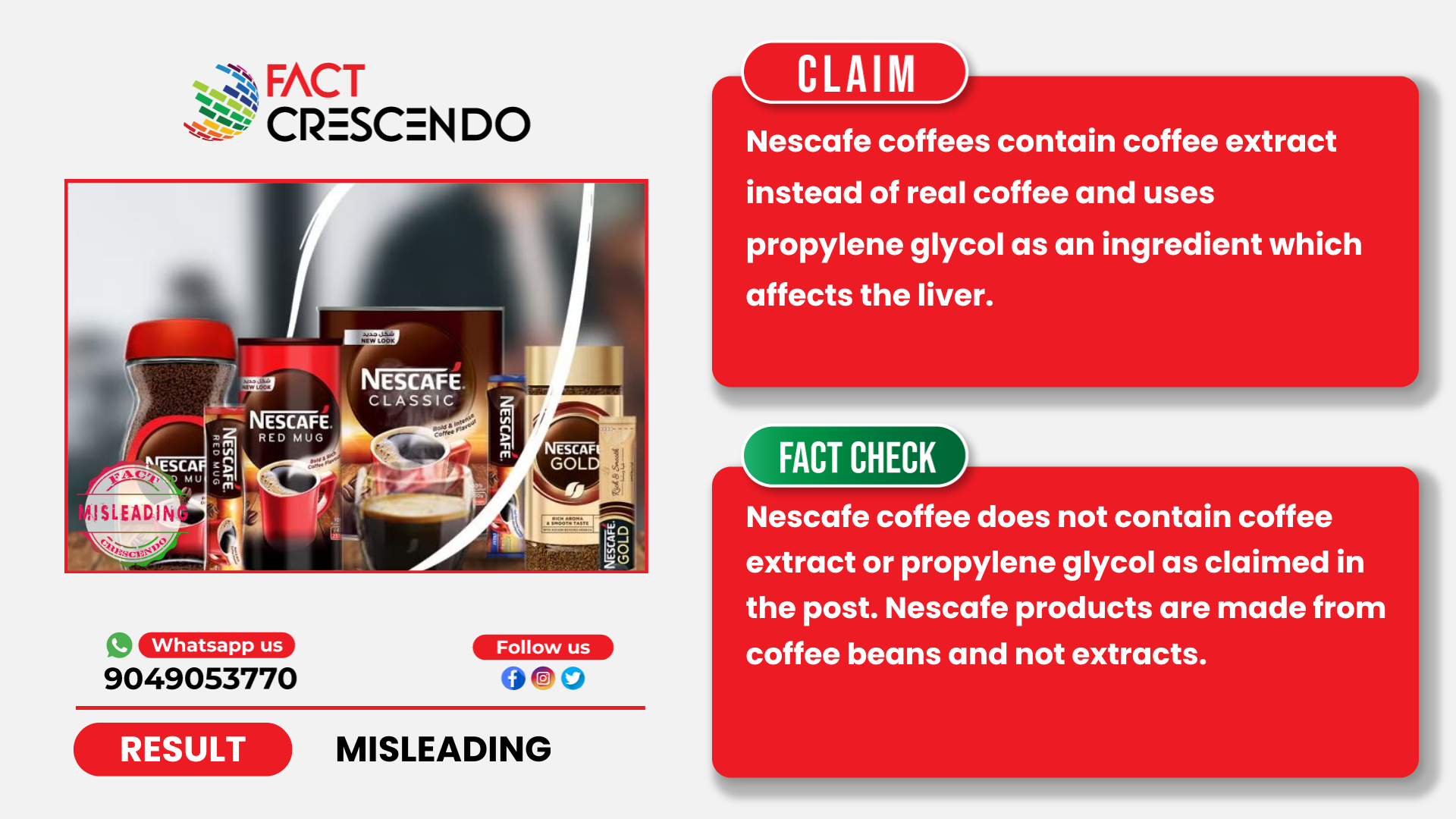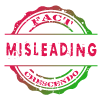
Nescafé is one of the world’s most popular instant coffee brands. It originated in Switzerland under Nestle company in 1938. Since then, it has become a global name and the products are being sold in many countries worldwide.
But recently, social media users have raised their concerns over the use of harmful chemicals in the products instead of real coffee which leads to many harmful diseases and affects liver and other important organs in the body.
However, Fact Crescendo found the claim to be misleading. Nescafe does not use harmful chemicals as claimed. The product is safe to consume.
What is the claim?
The claim states that Nescafe barely contains real coffee. Instead, it uses coffee extracts and many stabilizers which give its unique taste. The product also contains propylene glycol which is used as an antifreeze agent. This leads to liver and gut inflammation.
Fact Check-
Ingredients in Nescafe
First, we found out what are the ingredients used in various Nescafe coffee products. For this we randomly picked up a few Nescafe coffee and checked the list of ingredients mentioned in the label.
We found that Nescafe Sunrise contains Coffee beans (60%) and Chicory (40%) and Nescafe Classic contains only coffee beans. Nescafe Gold Cappuccino contains milk and sugar mix, milk-based creamer, soluble coffee powder and iodised salt.
We found that none of the above products mentioned the use of coffee extract, propylene glycol or any other chemicals as an ingredient.
For more clarification, Fact Crescendo contacted Nestle company. The company assured that all the ingredients that are used in their products are listed in its label. If an ingredient is not mentioned in the label, then it is not used in that product.
What is coffee extract? Does Nescafe contain real coffee or only extract?
Coffee extract is produced by mixing coffee beans with alcohol or water to create a concentrated coffee flavor which is used in many food products. Whole coffee beans are crushed coarsely and mixed with water or alcohol for a few weeks to obtain the flavor of coffee.
But Nescafe does not use coffee extract in its coffee powder to give the flavor. In its website, Nescafe clarified that it uses only approved quality Arabica and Robusta coffee beans to create signature flavors and easily soluble coffee granules.

Even Nescafe concentrated coffee contains ingredients like water, soluble coffee and acid regulators.
What is Propylene glycol? Is it used as antifreeze and does Nescafe use it?
Propylene glycol is a colorless, nearly odorless, and tasteless thick liquid. It’s used in many processed products because it helps them maintain their consistency, moisture, and texture. The chemical is usually made from petroleum, though some companies are now making it from plants like canola and soybean.
According to the Centers for Disease Control and Prevention (CDC), Propylene glycol is used by the chemical, food, and pharmaceutical industries as an antifreeze when leakage might lead to contact with food. The Food and Drug Administration (FDA) has classified propylene glycol as an additive that is “generally recognized as safe” for use in food. It is used to absorb extra water and maintain moisture in certain medicines, cosmetics, or food products. According to the World Health Organization, the acceptable dietary intake of propylene glycol is 25 mg of propylene glycol for every kilogram (kg) of body weight. Top of Page
As already mentioned above, Nescafe products’ labels do not mention Propylene glycol as an ingredient.
Conclusion:
Fact Crescendo found the claim to be misleading. Nescafe coffee does not contain coffee extract or propylene glycol as claimed in the post. Nescafe products are made from coffee beans and not extracts.

Title:Myth Busted: Nescafe uses real coffee and not harmful chemicals.
Fact Check By: Siddharth SahuResult: Misleading


